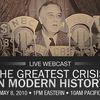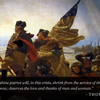11.7.2011 | 11:58
Prof. Christen Sųrensen’s speech at the European Schiller Institute Conference in Rüsselsheim, Germany on July 2, 2011
Prof. Christen Sųrensen:
Thank you. I think my presentation will be very good after yours, because I appreciate many of the points you made. I will mostly review the “Angelides Report,” which is also called the “Financial Crisis Inquiry Report.” It was a Congressional report made by ten members, six Democrats and four Republicans. It has more than 600 pages, and more than 6,000 footnotes.
It contains a lot of information which I think is very good to have in mind when we are discussing “What next?” I have, in fact, written 60 pages about it, so, at least myself, I will claim that I know quite a lot about it. The report is a little special because it is mostly based on interviews, and not as much on statistical data analysis, as maybe one would suppose, and it’s also very important to notice that it only described how the crisis developed. There are no exact suggestions about what you should do next. But, of course, if you read the report, it’s very difficult not to get some impression about what to do, and that’s good.
My analysis of this report, I think it’s fair to say, is from a traditional point of view of an economist, even thought I have a critical point of view of the financial sector, I will say, as we already have heard. I think you can learn a lot from this report. One of the things is that you should always pursue a decent public policy, and you cannot get public services, unless you are ready to pay for them, and I think that is very important. That is the reality in the U.S., and it has especially been a reality in Greece, but I’ll not give a hint about this now, because I will specialize in this Angelides Report.
And furthermore, I will only take two things up, especially the failures, in fact, of the credit rating agencies, which we have already heard about, and also the failures of the financial supervision institutions.
I think it’s very important to speculate about why there were such big failures. As we have already heard, there are three important credit rating bureaus in the world: Moody’s, Standard & Poor, and Fitch, and in the Angelides Report, Moody’s has been chosen to represent them, but they claim that it is also a representative for the two others, and I will quote from what they found about work of the credit rating bureau:
“We conclude the failures of credit rating agencies were essential cogs in the wheel of financial destruction. The three credit rating agencies were key enablers of the financial meltdown. The mortgage-related securities at the heart of the crisis could not have been marketed and sold without their seal of approval. Investors relied on them, often blindly. In some cases, they were obligated to use them, or regulatory capital standards were hinged on them. This crisis could not have happened without the rating agencies. Their ratings helped the market soar and their downgrades through 2007 and 2008 wreaked havoc across markets and firms.” (Page xxv)
That’s what they conclude in the Angelides Report, and there were two key words which they used to market those toxic papers, securities. They were mostly based on sub-prime mortgages, or All-A mortgages, and they collected a lot of them in an entity, and on that basis, they made more than 20 different residential mortgage-based securities. If you had Priority 1, you got the right to get all your money, and only if number 1 got their money, they would go further to number 2. What Moody’s and the others did, was, even thought they were sub-prime mortgages, they could, by this process, turn it around so that 80% of the denominations got a triple-A rating from the bureaus.
How did they do that insane thing? They did that using very complicated models, and those who should supervise those models, didn’t understand them. We already know in Denmark that people don’t like to say, “I don’t understand.” We know from Hans Christian Andersen’s “The Emperor’s New Clothes,” that it was a child who said, “He has no clothes on.”
And the way they did it, was through two things. They assimilated quite a number of scenarios. On average, in those scenarios, they assume that house prices would increase by four percent a year, and this was the first very essential assumption. The second very essential assumption, was that they said that if the price of one house goes down, it would not have implications for the others, but everybody can see that if the housing prices go down, it is not only one person who owned a house who would be hit, but it would be all, and that was why, I would nearly say that it was a criminal act, the way it was done.
And, therefore, in my opinion, as you can follow based on your presentation, I think it can be very essential to introduce Glass-Steagall, but we also need to take a much broader view of what went wrong, and therefore, I think that the Angelides Report is very important.
As we already heard, the form of the credit rating bureaus were not listed companies. In fact, that happened in 2000, and after 2000, they completely changed behavior, and I again quote from the Angelides Report:
“Many former employees said that after the public listing [of Moody’s] (in 2000), the company culture changed – it went ‘from [a culture] resembling a university academic department to one which values revenues at all costs,’ … The former managing director Jerome Fons, who was responsible for assembling an internal history of Moody’s agreed: ‘The main problem was … that the firm became so focused, particularly the structured area, on revenues, on market share, … , that they willingly looked the other way, traded the firm’s reputation for short-term profits.’” (Page 207)
And it is further elaborated by people from Moody’s in the report, and I will quote one more, because I think that is very interesting, from [Andrew] Kimball, who was the chief credit officer at Moody’s:
“Ideally, competition would be primarily on the basis of ratings quality, with a second component of price and a third component of service.
Unfortunately, of the three competitive factors, rating quality is proving the least powerful given the long tail in measuring performance. … The real problem is not that the market does underweights [sic] ratings quality but rather that, in some sectors, it actually penalizes quality by awarding rating mandates based on the lowest credit enhancement needed for the highest rating. Unchecked, competition on this basis can place the entire financial system at risk. It turns out that ratings quality has surprisingly few friends: issuers want high ratings; investors don’t want rating downgrades; and bankers game the rating agencies for a few extra basis points on execution.” (Page 210-211, Kimball memorandum from October 2007).
And that is, we have to learn a lesson from this, because the problem was that they became a listed company, and if they are depending on profit, and if your business depends on you giving good ratings, then we knew that you had moral hazard.
In economics, we also have another n for this. It’s called “Gresham’s Law,” because Gresham expressed that bad things eliminate good things. It’s from bimetallism, where we had both silver and gold, and many years ago, Gresham in London taught that lesson, and that is a very basic thing you have to notice – that bad things can eliminate good things.
And therefore, I think that it’s very essential to change – to maybe put the rating agencies under the supervision, or direct authority of the central banks, because it is the central banks which have to clean up the mess afterwards. So there should be a very strong reaction against that, and I think the Angelides Report tells that very clearly. So I think that what I say here is more or less in accordance with your presentation, at least that’s my interpretation.
The second thing is, why did the regulators also make very big mistakes? I will again quote from the Angelides Report:
“We conclude widespread failures in financial regulation and supervision proved devastating to the stability of the nation’s financial markets. The sentries were not at their posts, in no small part due to the widely accepted faith in the self-correcting nature of the markets and the ability of financial institutions to effectively police themselves. More than 30 years of deregulation and reliance on self-regulation by financial institutions, championed by former Federal Reserve chairman Alan Greenspan and others, supported by successive administrations and Congress, and actively pushed by the powerful financial industry at every turn, had stripped away key safeguards, which could have helped avoid catastrophe. This approach had opened up gaps in oversight of critical areas with trillions of dollars at risk, such as the shadow banking system and over-the-counter derivatives markets. In addition, the government permitted financial firms to pick their preferred regulators in what became a race to the weakest supervisor. [Prof. Sųrensen added: “Gresham’s Law”]
Yet we do not accept the view that regulators lacked the power to protect the financial system. They had ample power in many arenas and they chose not to use it. … Too often, they lacked the political will – in a political and ideological environment that constrained it – as well as the fortitude to critically challenge the institutions and the entire system they were entrusted to oversee. (Page xviii)
Those are very tough words, I suppose. Here, I think, we can also learn a lesson, and I shall suggest two things. One of the big failures in the States was that there were so many regulatory entities, so nobody really has the responsibility for doing it well. “It’s not my problem. It’s the others’ problem.” And they not only have many regulatory institutions on one level, but they also have institutions on the federal level, and on the state level.
And they changed the law in such a way that the financial firms could choose their regulator, and, as they have to pay for their regulator, they chose those which offered the lowest cost, and therefore, it’s very dangerous to let the financial firms choose their own regulators. They should pay for it by paying into a common fund, and then the society should impose regulation on them. That is very, very interesting, so they [the regulators] would not be paid directly by themselves [the firms].
The third thing is that when you come to a big financial firm which makes a lot of money, and the CEO makes as much money as you never can dream about making during your whole life, you are very impressed by them. People are normally. Then [the Angelides Report] suggests that you should not take that attitude. Be more trusting in yourself -- to criticize. I think that that is very important.
I have taken those two points up here. I think that the Angelides Report has a lot of sources from which you can learn. How much money they used in lobbying, etc., etc. How silly they were. It’s incredible. What great bonuses they awarded to themselves. You get nearly sick reading it, but that is the question.
So I will stop my presentation here. We are a little behind, but I think that you can learn a lot from the Angelides Report about how we come out [of the crisis.] And the problem is, as you also stressed, how little there has been done afterwards – how little restriction there has been put on the financial sector, since the biggest crisis, at least since the 1930’s, and maybe even before! So that is really astonishing – that nothing more has been done, and, in fact, we have a bigger task to accomplish, because due to the financial crisis, the biggest firms are ever growing bigger, because there was a risk that some of them would go bust, so they were bought up by others. Maybe they were forced into it. At least two of the investment banks have been bought by the commercial banks. One went bust – that was Lehman Brothers. That is another question. But I think that we have a very big task there.
And in my own country, Denmark, I have asked for a financial commission to investigate what happened. It is quite amazing that we don’t even dare to investigate what happened in Denmark! Could we not learn anything about it? Our leading political leaders apparently seem to think not. That is rather astonishing, after such a big failure!
Video: http://schillerinstitut.dk/drupal/node/500
I thank you for listening to me. Thank you.
Flokkur: Stjórnmįl og samfélag | Facebook
Um bloggiš
Amazing Iceland and Icesave
Nżjustu fęrslur
- Washington Represents the Most Concentrated form of Evil in H...
- F William Engdahl - Totalitarian Democracy in the New World O...
- Ķ tilefni jįtningar Tony Bliar
- Washington's Path to War with Russia
- Obama Places World on Fast Track to Thermonuclear War
- State of the Union - Lyndon LaRouche - Jan 18, 2012
- Thanks for arriving early!
- Banned incredible Ron Paul Video
Fęrsluflokkar
Tenglar
Pólitķk
Stjórnmįl og kosningar 2007
- HJARI VERALDAR
- Inspired by Amazing Iceland Amazing Videos from Iceland
- FREE Iceland Crash Book Iceland Crash Enslaving a Small Nation. The Brutish Empire strikes again.
- ICALAND ECONOMIC DISASTER
- GLOBAL GLASS STEAGALL Saving the Planet Now!: A Global Glass Steagall
- Iceland Crash ! Vefsķša į ensku um hruniš į ķslandi
- Kvótagreifarnir Kvótabófarnir sem öllu rįša!
- Wordpress Stjórnmál My Wordpress Blog. Iceland Crash
- Freedom Burma. Restoration AUNG SAN SUU KYI er eini Nóblesveršlaunahafi ķ fangelsi !
Góšir Linkar
Įhugaveršir Linkar fyrir feršamenn,og ašra sportmenn.
- Silencer Brake Combo Gun silencer and gun Tech Books and accessories for rifles and pistols
- Heimasíða Rifflar BRS Custom Rifles Custom rifles precision made. Hunting and target rifles.
- Glass Bedding Rifles Leišbeiningar um hvernig į aš bedda riffle
- Custom Rifles Blog Custom Rifles, Gun silencer blog
- Double Action Brake Silencer og Muzzle Brake Combo.
- Síðan Mín ! How to make a gun silencer
- Gun Silencer How to make a gun silencer
- Amazing Iceland Video Collection
- GOOGLE PRECISIONGROUP
- MSN Precisiongroup
- YAHOO PRECISONGROUP
- Amazing Iceland !
- B.R.S. RIFLES BLOG
- TOOL DESIGN !
- RIFLEPRO BLOG !
- MSN RIFLEPRO SPACES
- Betri Rifflar !
- NÁTTÚRU VIDEO GOOGLE
- TOOLPATENT !
- VIDEO VERSLUN.
Bloggvinir
Heimsóknir
Flettingar
- Ķ dag (15.9.): 1
- Sl. sólarhring: 1
- Sl. viku: 13
- Frį upphafi: 21457
Annaš
- Innlit ķ dag: 1
- Innlit sl. viku: 12
- Gestir ķ dag: 1
- IP-tölur ķ dag: 1
Uppfęrt į 3 mķn. fresti.
Skżringar

 gammon
gammon
 bofs
bofs
 lovelikeblood
lovelikeblood










Bęta viš athugasemd [Innskrįning]
Ekki er lengur hęgt aš skrifa athugasemdir viš fęrsluna, žar sem tķmamörk į athugasemdir eru lišin.